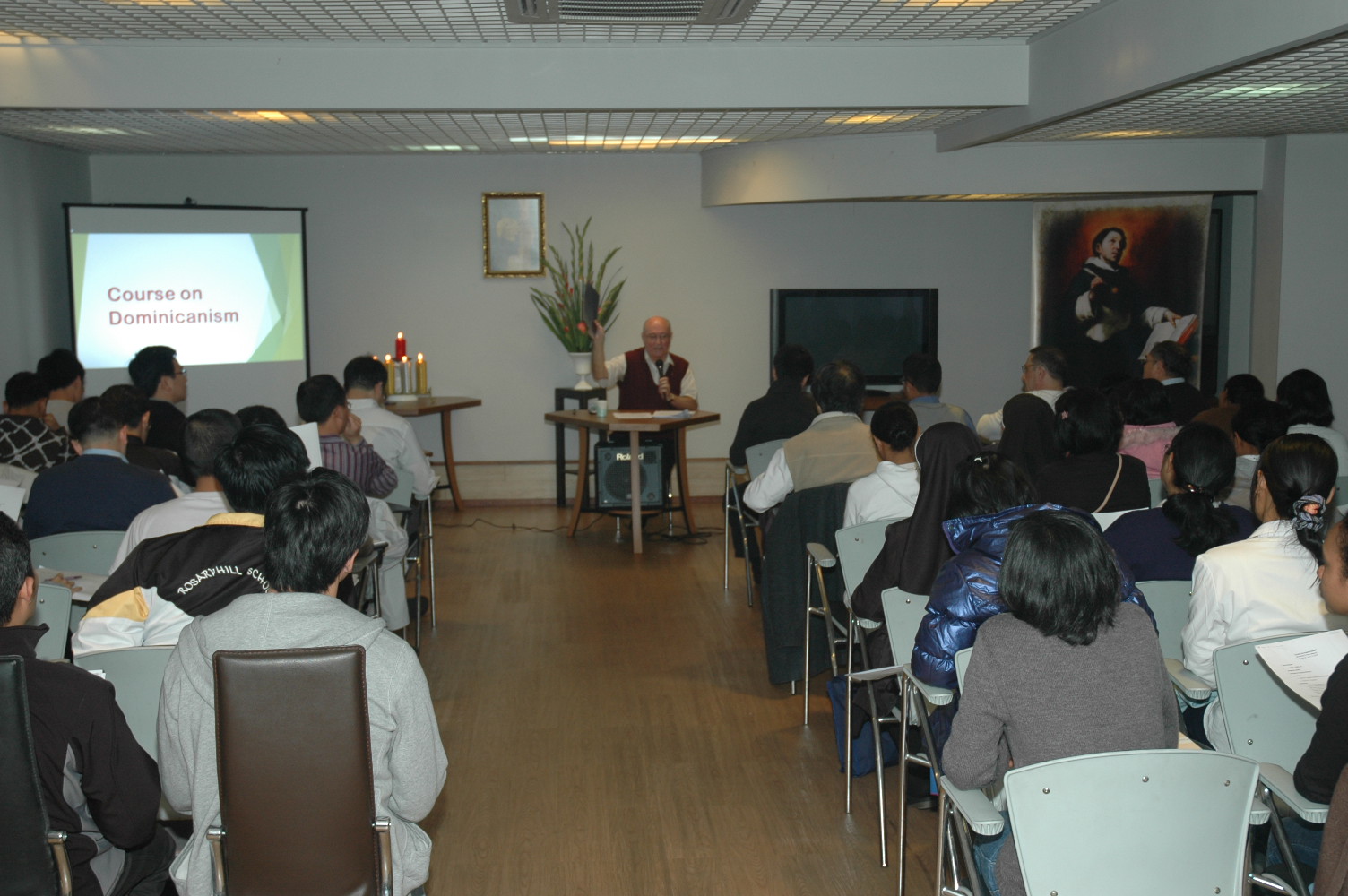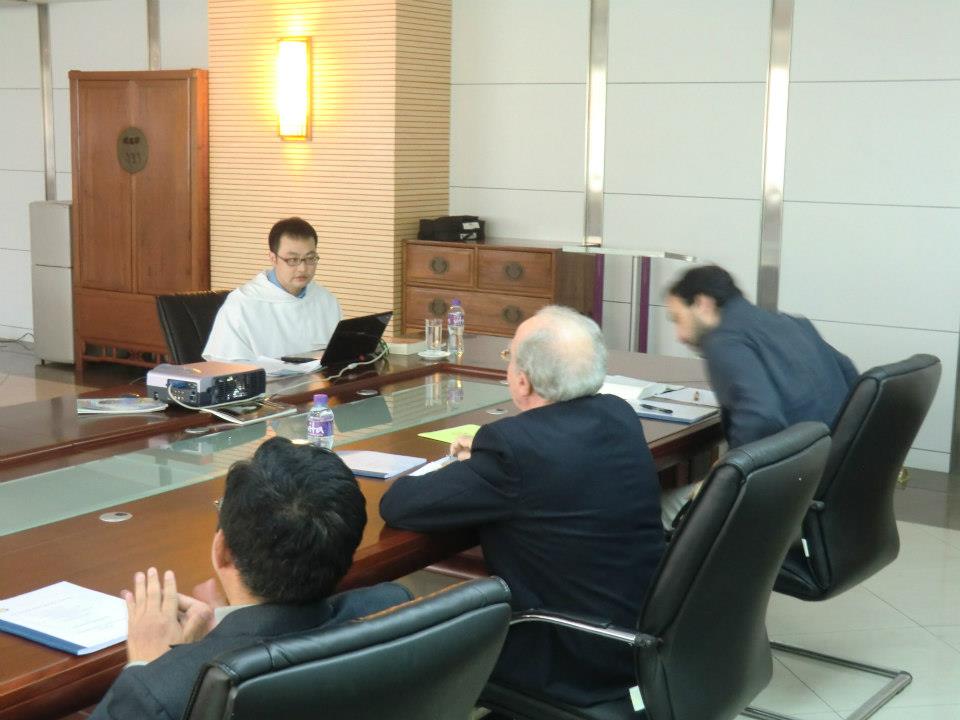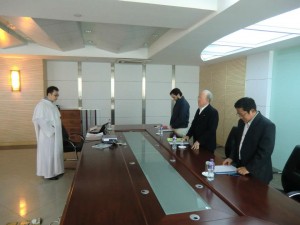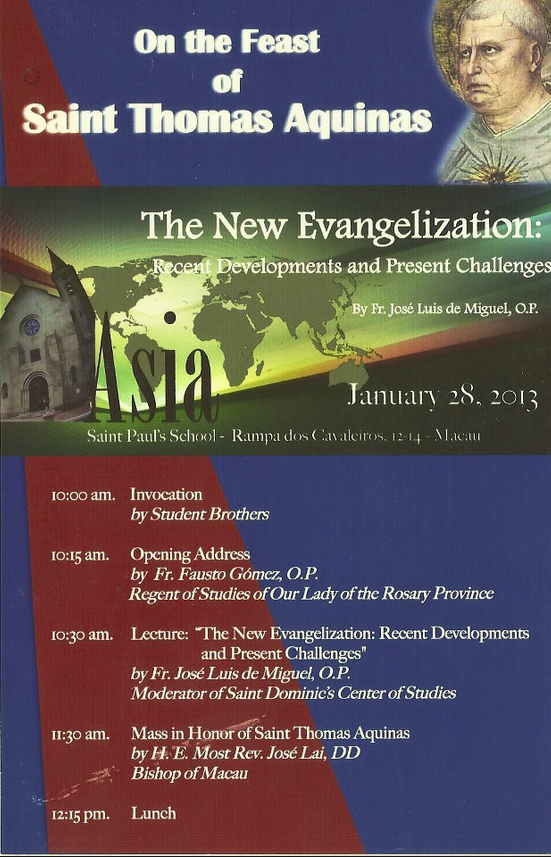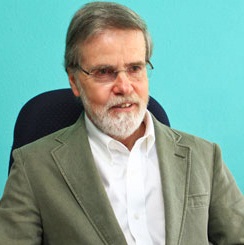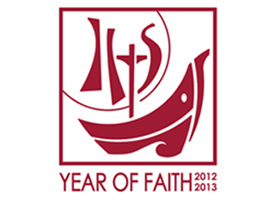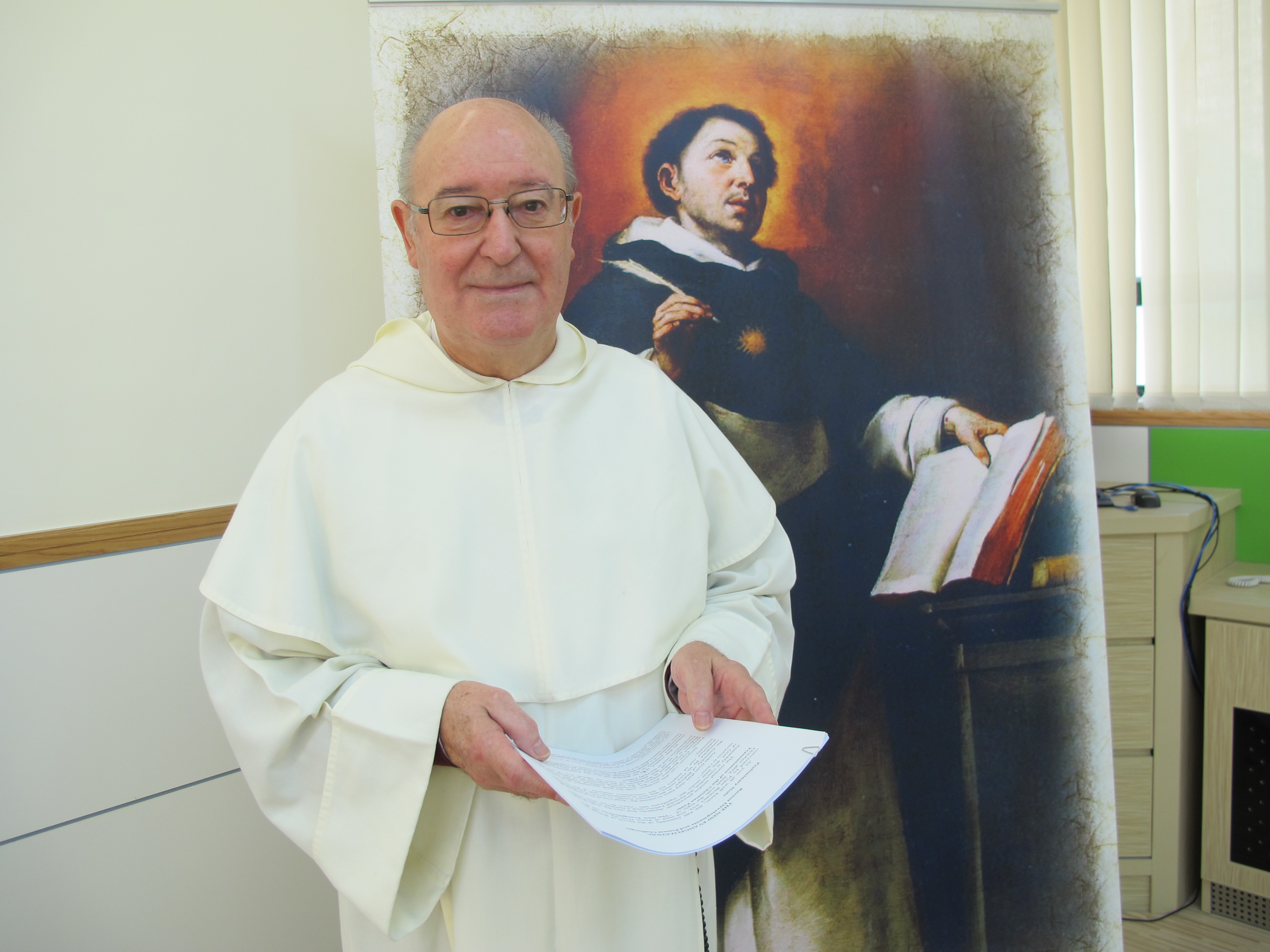
       Preliminary Note
 As you all well know, the XIII Assembly of the Synod of Bishops, convened by Pope Benedict XVI, and held at Rome from the 7 – 28 of October 2012, dealt with the topic of “The New Evangelization for the Transmission of the Christian Faithâ€.
The normal ‘modus procedendi’ demands, that once the work of the Assembly is concluded, the Synodal Fathers send a message to the People of God, this time under the significant title “Above all, we must convert ourselves to Christâ€[1], and then, send the fruit of their work to the Holy Father, in the form of Propositiones (58 of them), that may serve in a possible promulgation of a papal documentâ€, which we eagerly await[2].
 This said, I intend in this present paper, to offer you some wide brushstrokes regarding the stand of the Church on Evangelization. Then we’ll briefly see the New Evangelization as it was dealt with at the last Synod of Bishops. And finally, I will mention some of the most serious and urgent challenges that, in the opinion of the Synod Fathers, the Church is bound to face now and in the near future.
*******
Up to recent times, the Catholic Church was, and oftentimes still is, understood by many of her own members, as well as by those outside her life, to be primarily liturgical, pastoral and hierarchical. Other aspects, such as her involvement on evangelization, at home as well as at the frontiers of Christianity, the formation of persons, the promotion of people, the help to the needy, the defence against injustices etc., were not apparently considered relevant dimensions of her mission, or in any case, they were not allotted much time or dedication.
 Vatican II assumed the task of presenting the Church, community of the faithful “people of Godâ€, to the world as the XXth century response to the will of the Lord, in his “mission mandate†to his disciples: “Go then to all peoples everywhere and make them my disciples… And I will be with you always, to the end of the age†(Mt 28, 19-20).
 Since that mandate the Christian Community became: a) memory of Jesus, dead and resurrected, b) community of testimony: they are to be witnesses with their lives to Jesus’ death and resurrection, and consequently, c) a community essentially missionary. The words of the resurrected Lord, addressed to his disciples, are an invitation to the whole Church to constantly go out of herself, of her problems and domestic preoccupations, and open up with greater energy to the world. “A Church which feels she “owes the Gospel” to all men: evangelization is an intrinsic dimension of her life†(John Paul II)
 To carry out this mission, the Church, the disciples, count on the constant presence of Jesus who “will be with you always, to the end of time†(Mt 28, 20).
Shortly after Vatican II, Pope Paul VI convened a Synod[3] to define what the Church means by “evangelization”. The term, although as ancient as the Church herself, was ambiguous for many, and even today it does not always speak to some Catholics’ sense of mission. For many Catholics, the term itself sounds Protestant: “Isn’t evangelization and missionary activities something Protestants do?†Yet the Church teaches that she is missionary by her very nature, evangelization is a duty of every Christian.[4]
 In his post-synodal encyclical “Evangelii Nuntiandiâ€[5], Paul VI clearly
states: “We wish to confirm once more that the task of evangelizing all people constitutes the essential mission of the Church. It is a task and mission which the vast and profound changes of present day society make all the more urgent. Evangelizing is in fact the grace and vocation proper to the Church, her deepest identity. She exists in order to evangelize”. (Evangelii Nuntiandi 14).
 After affirming the role of every Christian (and not only the ordained priests) in spreading the Gospel, Paul VI calls for a “new Evangelizationâ€, “as a response to the new challenges that the contemporary world creates for the mission of the Churchâ€[6] The New Evangelization is a call, a new proposal to all Catholics to be evangelized and then go forth to evangelize the world, all peoples and their cultures.
 Pope John Paul II, on his side, in describing the main orientation of his pontificate, declared that “The Lord and Master of history and of our destinies has wished my pontificate to be that of a pilgrim pope of evangelization walking down the roads of the world, bringing to all peoples the message of salvationâ€[7]. In his “Redemptoris Missio†(December 7, 1990) presents a synthesis of the Church’s teaching about evangelization in modern times, re-directing and re-focusing the Church’s priorities. Not, of course, to give it a new message, for the content is always the one gospel given in Jesus Christâ€[8], but to give it, as Pope Benedict XVI says, the “newness of the proclamationâ€[9]
 Pope John Paul II speaks of an evangelization that is to be “new in its ardour, methods and expression”[10], and that is to be adapted to the people of our day.
 This new evangelization has some distinguishing characteristics, among them:
a) It is strongly Christocentric: “it is not a matter of merely passing on doctrine but rather of a personal and profound meeting with the Saviour”[11].
b) As his predecessor, he states that evangelization is the responsibility of the entire People of God…,[12] and it is not limited, therefore, to foreign missions, it should be addressed to all.[13]
c) Evangelization is directed to individuals and to whole cultures. (Redemptoris Missio, 52).
d) Calls for a missionary spirituality. We are called to know Christ and to make Him known. (Cf. Redemptoris Missio, 87).
 These three very important approaches –Vatican II, Paul VI and John Paul II- to the Church’s mission of evangelization would have seemed enough regarding the New Evangelization. Why, then, this new call for another New Evangelization?
I’m sure we all agree that Pope Benedict XVI is one of the most qualified, most deeply involved witnesses, and in many ways protagonist, of the life of the Church throughout the last decades. It is, perhaps, his testimonial life, that brought him now, in the sunset of his life, to call for another “new evangelizationâ€, in order to “respond to the new challenges that contemporary world creates for the mission of the Churchâ€[14] Â
- 1.    Need of a “new evangelizationâ€.
To those who ask: do we really need another “new evangelizationâ€?, the answer is “Yesâ€. And not only because the Gospel of Jesus, that the Church is bound to proclaim and to live, is being more and more challenged by the growth of secularism, the need to adjust to new realities of present day life; the increasing hostility toward Christianity; the weakening of religious values; the increasing number of baptized persons exiting from the Church, etc..
Or because, as the synodal Fathers say,
,-Changing societies and cultures call us to something new: to live our communitarian experience of faith in a renewed way and to proclaim it
through a new evangelization…â€[15]
-“The proclamation of the good news in different contexts of the world — marked by the processes of globalization and secularism — places different challenges before the Church: at times in an outright religious persecution, at other times in a widespread indifference, interference, restriction or harassmentâ€[16].
-Evangelization today demands “the proclamation of full freedom from everything that oppresses the human person, i.e. sin and its consequences. Without a serious commitment for life and justice and the change of the situations that generate poverty and exclusion (cf. Sollicitudo rei socialis, 36) there can be no progress. This is particularly true in the face of challenges of globalization†(Proposition 19). Likewise, “the Synod Fathers reaffirm that religious freedom is a basic human right. This includes the freedom of conscience and also the liberty to freely choose one’s religionâ€â€¦
But above all, a “new evangelization†is needed because the Church, the “people of Godâ€, must always be in a continuous process of renewal –ecclesia semper renovanda-, in order to keep pace with him who “makes all things new†(Rev. 21:4-5). Because we are constantly in need of a deep fidelity and conversion to the Lord who goes before us.
Pope Benedict talks about this “hermeneutic of reformâ€, “of renewal in continuity of the one subject-Church which the Lord has given to us. She is a subject that increases in time and develops, yet always remaining the one subject of the journeying People of Godâ€[17]. “In this way it will be possible to respond to the need for renewal required by the modern world and, at the same time, faithfully preserve the identity of the Church’s nature and missionâ€[18].
The mission of Christ’s Church is, then, challenged by numerous forces from “outside†herself.
But she herself is wounded in her heart. The Pope has spoken of a “spiritual ‘desertification’†that has advanced in the last decadesâ€[19], and recent scandals within the Church have created a “great disorientation that leads to forms of distrust of teachings and values that are essential for the followers of Christâ€[20].
In the “Message to the People of God†that the Synodal Fathers have sent to all of us it is said that “we, however, should never think that the new evangelization does not concern us personally. In these days voices among the Bishops were raised to recall that the Church must first of all heed the Word before she could evangelize the world. The invitation to evangelize becomes a call to conversion.
We firmly believe that we must convert ourselves above all to the power of Christ who alone can make all things new, above all our poor existence. With humility we must recognize that the poverty and weaknesses of Jesus’ disciples, especially of his ministers, weigh on the credibility of the mission. We are certainly aware – we Bishops first of all – that we could never really be equal to the Lord’s calling and mandate to proclaim his Gospel to the nations. We know that we must humbly recognize our vulnerability to the wounds of history and we do not hesitate to recognize our personal sinsâ€[21].
- 2.    “The newness of the proclamationâ€
 The “newness of the proclamationâ€, – says Benedict XVI, -, “does not consist primarily in the use of original methods or techniques — which of course, have their usefulness — but rather in being filled with the Holy Spirit and letting ourselves be guided by him… Essentially, evangelizers can bring Christ to others effectively when they themselves live in Christ, when the newness of the Gospel is reflected in their own lifeâ€[22]. For his Holiness, the evangelizer is, above all, a believer who bears a convincing and courageous witness to the Lord Jesusâ€[23]. And this, he says, applies to the whole of the Church’s life“[24]
Only Jesus is the fount, inspiration and model of the evangelizing work of his followers. There won’t be new evangelization if there aren’t new evangelizers; and there won’t be new evangelizers if there isn’t a more vivid, passionate contact with Jesus. Without him we will do anything but introducing his Spirit in the world.
Without underestimating other aspects of evangelization[25], Pope Benedict XVI has repeatedly expressed his concern, particularly regarding the “pastoral theme†of how to reach out to the growing number of disaffected Catholics. On numerous occasions he has stated that this seeks to be an evangelization that is directed “principally at those who, though baptized, have drifted away from the Church and live without reference to the Christian life…, to help these people encounter the Lord, who alone fills our existence with deep meaning and peace; and to favor the rediscovery of the faith, that source of grace which brings joy and hope to personal, family and social lifeâ€[26]
One would have expected a more direct treatment of this present, urgent topic, which has not, apparently, been given the special attention that it deserves.
 It is being critically said, that “too much of what we hear of “the new evangelization” is an one-way proposition. It’s saying, “We have the answers, we know what these poor, lost souls need”… By rushing in with answers, we may be missing the questionsâ€[27]. Or we might be answering questions that nobody asks… Some of the questions come –even if silently- precisely from those who have exited from the Church. They were not, of course, in the Synodal Assembly. Have the synodal Fathers sought or listened to their motives to exit the Church? Is there any realistic plan that could facilitate the dialogue with at least those among them who would be ready to do so? Is the Church ready to go to them, share fraternally their points of view, and heedfully help these people encounter the Lord and eventually learn from listening to their questions? Some Synod Fathers, like Bishop Brian J. Dunn, spoke of the opportunity to “acknowledge the call for a change in Church structures and advocated, in addition, the need for a “profound change of mentality, attitude and heart in our ways of working with lay peopleâ€[28]. Archbishop, now Cardinal, Luis Antonio Tagle, of Manila, said that for the church to be a place where people meet God, she needs to learn three things from the example of Jesus: humility, respect for the others, and “the power of silenceâ€. “Confronted with the sorrows, doubts and uncertainties of people, she cannot pretend to give easy solutions. In Jesus silence becomes the way of attentive listening, compassion and prayer. It is the way to truthâ€[29]
 The solution to the present situation will not come, I’m afraid, from just lamenting about contemporary society, the apparent disappearance of traditional values, the Catholics’ ignorance of basic prayers and teachings, etc.; or from just inviting them to come back, study the Catechism and go to Mass on Sundays… Something else has to be done, if we do not want the “new evangelization to remain a stilted and cerebral exerciseâ€[30].
       There are those who suspect that “silence†was auto imposed, to avoid other questions -such as the ordination to the priesthood of some especially prepared married men, or even the ordination of women. These and some other questions that have been a constant source of concern, are hanging around for quite some time. They would very likely surface, since in many instances, the so called drifting away from the Church is due not precisely to the lack of faith, or even to disenchantment with the Church, but to the simple fact that there aren’t enough ministers to turn to, in order to satisfy people’s religious needs.
- 3.    Some of the propositions for a new evangelization.
 The document sent to the Holy Father is composed of:
A brief Introduction, with 3 propositions (so they are called), an equally short Conclusion, with two propositions, and fifty three pro-positions, distributed into four sections.
Given the number and length of propositions, I shall limit myself to mentioning those that I find more relevant, or more new, actual.
1)Â Â Â The Nature of the New Evangelization. (Propositions 1-12)Â
 “The New Evangelization calls for particular attention to the inculturation of the faith… Inculturation involves the effort to have the Gospel take flesh in each people’s culture†(Proposition 5).
2)   The Context of Church’s Ministry Today (Propositions 13 – 25)
 -“The Synod Fathers reaffirm that religious freedom is a basic human right. This includes the freedom of conscience and also the liberty to freely choose one’s religion. We are in solidarity with our brothers and sisters, in different parts of the world, who are suffering from lack of religious freedom and even persecution…The Synod Fathers propose that the Holy Father consider the opportuneness of establishing a commission of Church leaders representing various parts of the Church throughout the world…, to address attacks on religious liberty, and to obtain accurate information for public witness to the fundamental right to religious freedom and freedom of conscience†(Proposition 16).
-“In order to advance a New Evangelization in society, greater attention should be given to the Church’s social doctrine…, [which] should permeate the content of catechesis, Christian education, formation of seminarians and religious, the continuing formation of bishops and priests and most especially the formation of the laityâ€. (Proposition 24).
-“The use of means of social communication has an important role to play in order to reach every person with the message of salvation. In this field, especially in the world of electronic communications, it is necessary that convinced Christians be formed, prepared and made capable to transmit faithfully the content of the faith and of Christian morality…. Education in the wise and constructive use of social media is an important means to be utilized in the New Evangelizationâ€. (Proposition 18).
3)   Pastoral Responses to the Circumstances of Our Day (Propositions 26 – 40)
 -“….Children, teenagers and young people have a right to be evangelized and educated. The schools and Catholic universities respond in this way to this need. Public institutions should recognize and support this right.
– “Schools must be free to teach. This freedom is an inalienable right. For this reason in order to ensure that our institutions are agents of evangelization and not just products of evangelization, the Synod:
1) Encourages Catholic educational institutions to do all that is possible to preserve their identity as ecclesial institution.
2) Invites all teachers to embrace the leadership which is theirs as baptized disciples of Jesus, giving witness through their vocation as educators; and
3) Urges particular Churches, religious families, and all those who have responsibility in the educational institutions, to facilitate the coresponsi-bility of lay people, offering adequate formation and accompaniment for thisâ€. (Proposition 27).
-“The Synod proposes that the New Evangelization be considered as an integral dimension of the mission of every theological faculty and that a department of New Evangelization studies be established in Catholic Universities†(Proposition 30).
– “Today there are new poor and new faces of poverty: the hungry, the homeless, the sick and abandoned, drug addicts, migrants and the marginalized, political and environmental refugees, the indigenous peoples. The current economic crisis seriously affects the poor. Among the poorest in contemporary society are the victims of grievous loss of respect for the inviolable dignity of innocent human life. The preferential option for the poor leads us to seek out the poor and to work on their behalf so that they may feel at home in the Church. They are both recipients and actors in the New Evangelization’. (Proposition 31).
– In every diocese, at least one place should be especially dedicated in a permanent way for the celebration of this sacrament†(Penance), where priests are always present…The sacrament should be especially available, even on a daily basis, at places of pilgrimage and especially designated churches… and in every parish community a suitable time should be set apart for hearing confessions†(Proposition 33).
4)   Agents / Participants of the New Evangelization (Propositions 41 – 58)
        -“The New Evangelization should strive to address significant pastoral problems around marriage, the case of divorced and re-married, the situation of the children, the fate of abandoned spouses, the couples who live together without marriage and the trend in society to redefine marriage…It should also include a respectful invitation to all those who live alone, to experience God in the family of the Church†(Proposition 48).
         –“The Synod asks Religious Orders and Congregations to be fully available to go to the geographical, social and cultural frontiers of evangelization. The Synod invites religious to move toward the new aeropaghi of missionâ€. (Proposition 50).
         To finish this already long exposition let me quote the words that the Synodal Fathers addressed to the People of God:
“Our world is full of contradictions and challenges, but it remains God’s creation. The world is wounded by evil, but God loves it still. It is his field in which the sowing of the Word can be renewed so that it would bear fruit once more… We do not ignore the problems that such challenges bring, but they do not frighten us…[31]
In the face of the questions that dominant cultures pose to faith and to the Church, we renew our trust in the Lord, certain that even in these contexts the Gospel is the bearer of light and capable of healing every human weakness. It is not we who are to conduct the work of evangelization, but God, as the Pope reminded us: “The first word, the true initiative, the true activity comes from God and only by inserting ourselves into the divine initiative, only by begging this divine initiative, will we too be able to become – with him and in him – evangelizersâ€[32].
May Mary, our Mother, “Star of the New Evangelizationâ€, guard us on our way during this Year of Faith, “an exquisite portal into the path of the new evangelizationâ€.
Thank you very much for your kind and patient attention.
                                               José Luis de Miguel, OP Â
(Macau, 2013. 02. 04)
[1] XIII Ordinary General Assembly of the Synod of Bishops. “Above all, we must convert ourselves to Christ†(26 October 2012).
[2] It’s, besides, the humble request of the Synod Fathers, and the first proposition they have for Pope Benedict XVI, which reads as follows: “The Synod Fathers also humbly request the Holy Father to consider the opportuness of issuing a document on transmitting the Christian faith through a new evangelizationâ€.
[3] Pope Paul VI established “motu proprio†(on his own initiative) the Synod of Bishops for the Universal Church on 15 September 1965, by his Apostolic Letter Apostolica Sollicitudo. Literally speaking the word “synodâ€, derived from two Greek words “sunâ€,  meaning “together†and “odos†meaning “road†or “wayâ€, means a “coming togetherâ€. A Synod is a religious meeting or assembly at which bishops, gathered around and with the Holy Father, have the opportunity to interact with each other and to share information and experiences, in the common pursuit of pastoral solutions which have a universal validity and application.
[4] Cf. Lumen gentium 16-17; Ad gentes, 2, 23, 35.
[5] “Evangelization in the Modern Worldâ€, issued on 8 December 1975, following the work of the Synod which he called on the same theme (07 September 1974 to 26 October 1980).
[6] Cf. John Paul II, “Crossing The Threshold of Hope (Knopf: New York 1994) p 114.
[7] México City, May 6, 1990.
[8] “The Task of the Latin American bishops”, Origins 12 (March 24, 1983, p. 659-62). This speech may be the first time that John Paul II uses the term “new evangelizationâ€.
[9] Benedict XVI. Angelus. Saint Peter’s Square, Wednesday, 26 December 2012.
[10] John Paul II, Discourse to the XIX Assembly of CELAM, Port-au-Prince, 9 March 1983, n. 3.
[11] This is not new in the Church’s proclamation. However, Pope John Paul II’s constant emphasis and exaltation of Jesus Christ as Lord and Master was very significant for the Church at that time in history (Cf. Redemptor hominis, 1).
[12] “Missionary activity is a matter for all Christians, for all dioceses and parishes, Church institutions and associations”.
13John Paul II distinguishes three “situationsâ€, a) the mission ad gentes, b) the normal pastoral care, and c) what he calls, the “intermediate situationâ€, those who, being baptized, lived far removed from Jesus and his Gospel, and, therefore, need to be re-evangelized (Cf. Redemptoris missio, 33). We’ll come to this later on in our exposition.
[14] John Paul II, “Crossing the Threshold of hopeâ€, (Knopf, New York, 1994, p. 114). Cf. Discourse to the XIX Assembly of CELAM, Port-au-Prince, 9 March 1983, n. 3).
[15] New Evangelization. Synod of Bishops 2012. “Above all, we must convert ourselves to Christâ€, n. 2. The FABC (Federation of Asian Bishops’ Conferences) speak of “the signs of the times, the social mega-trends in Asia and our own ecclesial realities†(Cf. “Renewed Evangelizers for New Evangelization in Asiaâ€. Message of the X FABC Plenary Assembly. Xuan Loc, Vietnam, 10-16 December 2012.
[16] XIII Ordinary General Assembly of the Synod of Bishops’ Conferences, “The New Evangelization for the Transmission of the Christian Faithâ€. (Proposition 13).
[17] Homily for the Eucharistic celebration for the opening of the Year of Faith, Rome, 11 October 2012
[18] XIII Ordinary General Assembly of the Synod of Bishops. “The New Evangelization for the Transmission of the Christian Faithâ€. 7-28 October 2012. Proposition 12.
[19] Homily for the Eucharistic celebration for the opening of the Year of the Faith, Rome, 11 October 2012.
[20] Catholic Reporter, Oct.27, 2012. Editorial
[21]  Synod of Bishops 2012. New Evangelization. “Above all, we must convert ourselves to Christâ€, n. 5
[22] Benedict XVI. Angelus. Saint Peter’s Square, Wednesday, 26 December 2012. “We are ever more aware that the need to be a more Christ-experiencing and Christ-witnessing com-munityâ€(FABC, Introduction).
[23] Ibid. “In the final analysis, we proclaim the one whom we have seen, whom we have heard and touched (1 John 1:1-3). This personal encounter and discipleship is indispensable. Without it none will be able to touch the soul of Asia. (Cf. FABC, 1).
[24] Homily at the closing of the Synod, 28 October 2012.
[25] Cf. Redemptoris missio, 33: “Pastoral themes†(Benedict XVI), “situations†(John Paul II); Cf. XIII Ordinary General Assembly of the Synod of Bishops. “The New Evangelization for the Transmission of the Christian Faithâ€. 7-28 October 2012. Proposition 7.
[26] Benedict XVI. “Homily for the Eucharistic celebration for the solemn inauguration of the XIII Ordinary General Assembly of the Synod of Bishopsâ€, Rome, 7 October 2012. Cf. New Evangelization. Synod of Bishops 2012: “Above all, we must convert ourselves to Christâ€, n. 2. …“Recovering the centrality of the divine word in the Christian life leads us to appreciate anew the deepest meaning of the forceful appeal of Pope John Paul II: to pursue the missio ad gentes and vigorously to embark upon the new evangelization, especially in those nations where the Gospel has been forgotten or meets with indifference as a result of widespread secularismâ€. (Benedict XVI, VERBUM DEI, 122. Rome, 30 September 2010).
[27] National Catholic Reporter. Editorial NCR, Oct. 27, 2012.
[29] Quoted by the National Catholic Reporter, l.c.
[31] “We should not be led into lethargy or pessimism by Asian social mega-trends which threaten the fabric of our society, the stability of the family and the faith-vision of the Christian community itself…The “small flock†of Jesus should not be timid or fearful among Asia’s millions, more than 60% of the world’s population. For we have the singular resource of our faith, Jesus Christ himself, the unique gift of God to humanity…â€. (FABC, Conclusion).
[32] New Evangelization. Synod of Bishops 2012. Message of the Synod of Bishops to the People of God. “Above all, we must convert ourselves to Christâ€, n. 6. October 26, 2012. Benedict XVI, “Meditation during the first general Congregation of the XIII General Ordinary Assembly of the Synod of Bishopsâ€, Rome, 8 October 2012.

Thomas Aquinas (1225-1274), philosopher, humanist, theologian, saint and mystic continues to be very important and significant for theology today and in particular for the Dominicans for whom he is essential part of their tradition. The Angelic Doctor continues to be relevant also for the whole Church, which made him Doctor of the Church and Patron of Catholic Schools.
The outstanding Dominican of the 13th century is still – as Vatican II calls him – a special master (OT, 16) and guide (GE, 10). Pope Paul VI calls St. Thomas apostle of truth; Blessed Pope John Paul II, outstanding philosopher, and Pope Benedict XVI, an outstanding model for theologians (Paul VI, Lumen Ecclesiae, 10; John Paul II, Fides et Ratio, 44; Benedict XVI, Address: June 2, 2010).The Angelic Doctor is “light for the Church and the whole world†(See Sapientia Christiana, art. 71, footnote 23, and art. 80 footnote 26; Canon Law, 252, # 3). The great theologians of our times highly recommend to all students of philosophy and theology the Universal Doctor Brother Thomas Aquinas, including Rahner, Chenu, Congar, Schillebeeckx, Gustavo Gutierrez and Clodovis Boff.
Certainly, Brother Thomas is not “the exclusive doctor†of the Church: there are 33 more doctors of the Church, including three women. As Dominicans, we study St. Thomas not just to repeat him but to re-create him in our time. Our brother Dominican Yves Congar says:
St. Thomas is a master of thought, a model of loyalty and intellectual honesty, a man of dialogue, the symbol of open-mindedness, the genius of reality. We should remain faithful to his spirit… St Thomas is proposed as a master (by Vatican II). This does not mean simply repetition and the exclusion of other theologians. Rather it means that we study under his guidance; we follow his spirit
Is Thomas Aquinas still relevant? Not long ago, I asked our students in Macau a question to be answered in writing: If St. Thomas would live in our time, what would he do? One student answers: “Many young Europeans would be inspired by him and entered the Dominican Order.â€Â Another student responded: “He would be simply like one of us.†I do not think, another says, “St. Thomas would be a Dominican today, because we do not have the spirit of Dominic that St. Thomas had.†One of the most repeated answers – differently formulated – is: “I think he would surely use internet or laptop to communicate with his friends. He would be a prominent professor. He would enjoy community life. He would go where the Provincial asked him, but I do not think he would like spicy food… I don’t know whether he would drink beer and wine or not, but he would drink something for certain.â€
The majority of the student theologians refer to the Summa Theologiae or Summa Theologica. These are some of their answers: “I think he would not write the Summa Theologica today.†“I believe he would still write the Summa Theologiae but the context of it would not be exactly the same as we have it now. He would surely pay more attention to current problems, such as global warming, ecumenism and relativism.†“On one hand, he would develop some parts of the Summa; on the other, he would remove some parts of it; he would develop more his treatise on abortion, contraception, capital punishment, euthanasia.†“It is almost impossible for St. Thomas to write the Summa today; he would write something, but not the Summa.â€
A week ago I read the news that the translation of the Summa in Japanese had just been finished: 45 volumes, 20 of them – including the last ones – by philosopher Ryosuke Inagaki who, when asked if the work was difficult, says: “It was not hard. Thomas’ writing is like a piece of Bach, with a rhythm that makes it easy to approach.†Some time ago, Inagaki himself published a pocket edition of the Summa entitled My Way of Life. Why this title? He answers: “This title really brings out the defining feature of the Summa Theologica. St. Thomas wanted to write a roadmap for people who really and truly seek happiness.â€(See ucanews 1/8/2013) It is still useful – let me add – to begin the treatise of moral theology after Thomas with questions on happiness or beatitude and, therefore, on the meaning of life, which continues to be a very poignant question in our time.
Is St. Thomas still relevant today? Two other interesting answers from my students: “St. Thomas Aquinas is still alive today; he is present within you and me.†“Inspired by his creativity and faithfulness to truth, love, justice and peace, we all can be St. Thomas of the 21st Century.”

St. Thomas, who according to Chesterton produced “books enough to sink a ship or to stock a library†(St. Thomas Aquinas The ‘Dumb Ox’, 1956), is still relevant today. However, his writings will not be fully meaningful to us unless we re-encounter in faith the God who inspired St. Thomas (S. Pinckaers). We Dominicans with so many others who love him are obliged to show Thomas’ relevance today. Thomas, the Doctor of the Eucharist continues teaching us many permanent significant points on God, Christ the human person, happiness, virtue, grace, love. We are asked to make those points significant for our times, in a world permeated by globalization, technology, relativism, and materialism.
Let me mention here three simple relevant texts for our journey: on life, truth, and love. On life: “Prius vita quam doctrina†or first life, then doctrine. (I strongly think that Thomas would also be today against the death penalty!). On truth: “Every truth, regardless of who said it, comes from the Holy Spirit†(I-II, 109, 1 ad 1). On love: “All things issue from charity as from a principle, and all things are ordered towards charity as to an end†(In Jn. XV, 2) Love is always the value and the virtue of life. It is, as Thomas says, the form of all virtues.
Let me add a final point! St. Thomas faced the relevant questions of his time in his famous Quaestiones Disputatae (disputed questions), such as questions on evil, truth, virtue, religious life, etc. Today we have to follow Thomas’ practice: to face the relevant topics of the day. We have to answer the questions people ask, questions on fundamentalism, dialogue, morality in democracy, the absence of God, new evangelization, etc.
Someone has said that the two main qualities that distinguish Thomas’ writings are clarity and brevity. We should all – teachers, preachers, leaders, politicians – strive for clarity and brevity in a world overcrowded with words, lies and blurred truths; but still a hopeful world. We all strive to practice what we teach or ask others to do. “Let Christ, our teacher, instruct us that, on the feast of St. Thomas, we may learn your truth and practice it in love.â€
   (F. Gomez, Macau, January 28, 2013)
Â
Â
Â
Â
Â
Â
